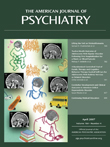The Effects of an Indigenous Muscarinic Drug, Betel Nut ( Areca catechu ), on the Symptoms of Schizophrenia: A Longitudinal Study in Palau, Micronesia
Abstract
Objective: This study tested the findings of a prior study indicating a therapeutic relationship between consumption of betel nut and symptoms of schizophrenia. Method: The subjects were 65 outpatients with diagnoses of schizophrenia or schizoaffective disorder. Symptoms rated with the Positive and Negative Syndrome Scale were compared between high- and low-consumption betel chewers in a repeated-measures design. Movement disorders were assessed with the Abnormal Involuntary Movement Scale and Simpson-Angus Rating Scale. Global health and social functioning were assessed with the Medical Outcomes Study 12-item and 36-item Short-Form Health Surveys, respectively. Results: Male high-consumption betel chewers had significantly milder positive symptoms than low-consumption chewers over 1 year. Betel chewing was not associated with global health, social functioning, or movement disorders. Betel chewing was associated with tobacco use but not with cannabis or alcohol. Conclusions: These findings have clinical significance in betel-chewing regions and broader implications for theory of muscarinic neurophysiology in schizophrenia.



